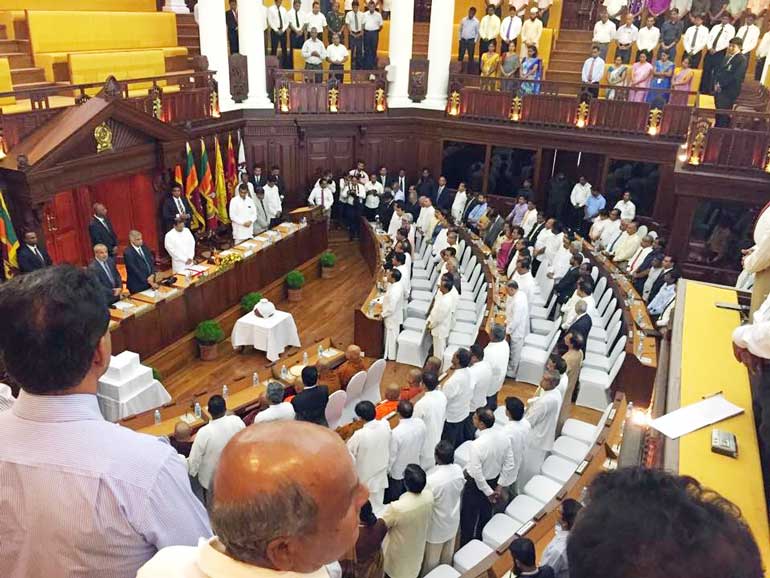Monday Feb 16, 2026
Monday Feb 16, 2026
Saturday, 19 September 2015 00:43 - - {{hitsCtrl.values.hits}}

In the early days ministers were appointed within a few days after a general election and they started work straightaway. There were only Cabinet ministers. The deputies were known as Parliamentary Secretaries (not to be mixed with Permanent Secretaries) and were not counted in any way along with ministers. Today all three types of ministers are often counted as one lot – naturally the ‘jumbo’ becomes even larger
It’s a month after the general election. We are still seeing pictures of ministers of all three types – Cabinet (46), State (19) and Deputy (23) – starting work in their offices and making speeches. Possibly some would have waited for auspicious times. Then there are receptions in their electorates. Some may possibly not yet got their offices. 
Whatever said and done, it’s time to get down to work. In the early days ministers were appointed within a few days after a general election and they started work straightaway. The numbers weren’t big. Accommodation was no problem. There were only Cabinet ministers. The deputies were known as Parliamentary Secretaries (not to be mixed with Permanent Secretaries) and were not counted in any way along with ministers. Today all three types of ministers are often counted as one lot – naturally the ‘jumbo’ becomes even larger.
The debate whether what has been formed is a National Government (Jathika), a Unity (Sammuthioqasdi) Government or a plain and simple Coalition (Havul) has died down. The Prime Minister was able to get Parliamentary approval to have more than 30 Cabinet ministers and 40 State/Project and Deputy ministers (as laid down in the 19th Amendment to the Constitution) on the ground that it is a National Government. Present numbers are 48 Cabinet ministers and 45 others.
At the time of writing there are two more Cabinet vacancies and three others to be filled.
Meanwhile, 44 Secretaries have also been appointed, but the functions of each ministry have yet to be gazetted. At a first glance at the portfolios, the mix is quite complex.
In addition to Defence, the President is keeping the subjects of Mahaweli Development and Environment under him. A State Minister for Defence and a Deputy Minister for Mahaweli and Environment have been appointed.
‘Please deliver’
In an analysis of the newly-formed Government, a writer to a Sinhala daily had done a timeframe on the Government’s 60-month program: “There is no time to rest. Two months out of the 60 would be over by the time the Cabinet and other ministers finish attending the religious ceremonies, political and other welcome receptions. At least another month will be needed to form the proposed Parliamentary committees. In the meantime if local government elections are going to be held, the Government and the Opposition will forget not only ‘yahapalanaya’ but even ‘ratapalanaya’ and spend the whole 24 hours a day on the elections. That will also involve another at least two months. And then there will be celebrations for Christmas and Sinhala Avurudda followed by Vesak and Poson festivals. At the end of it, the balance will be less than 54 months. These calculations do not include any possible natural disasters.”
Taking all this into consideration the writer pleads: “Please gentlemen, deliver what you have undertaken to do swiftly without taking your own sweet time and wasting time with bogus talk (‘puhu kaivaru’). If not, you may still be alright but not the general public.”
Two MPs out
It’s rather unusual for MPs to resign even before Parliament sessions have got going. After attending just two days, two have resigned. One was JVP National List MP, S.C. Mayadunne and the other UPLF/SLFP MP from Badulla District, C.S. Dasanayake, who resigned to become Chief Minister, Uva Provincial Council.
Unlike earlier Parliaments when a by-election was held each time an MP resigned or died, now the next in the preferential list gest the chance. In Badulla, the next UPLF candidate in the list is Lakshman Seneviratne, who was in the last Parliament.
Bimal Ratnayake is the JVO nominee in place of Maaydunne.
Disappointed
Former Diyawadana Nilame, Neranjan Wijeratne would have been surprised with the result of the recent election to select the new DN. He came third and last (the fourth candidate Kaushalya Dela withdrew) with 31 votes.
It was a resounding victory for the incumbent DN Nilanga Dela. He collected 205 votes in the 294-strong electorate and will serve a second 10-year term until 2025. The runner-up Gayan Heenhenda got 53 votes. There were five spoilt votes.
Moving up
Three Chief Ministers getting into Parliament gave a chance for three councillors to move up. They have been replaced by three veteran local politicians. The new CMs are Isura Devapriya (Western PC), Dharmasiri Dassanayake( Wayamba PC), and Chamara Sampath Dasanayake (Uva PC). All three are from UPLF/SLFP. The Uva CM is once again a UPLF member though the earlier CM was from the UNP.
The three CMs who are now MPs are UPLF/SLFP’s Prasanna Ranatunga and Dayasiri Jayasekera and UNP’s Harin Fernando. Dayasiri J and Harin F who had both been MPs (the former left the UNP and joined the SLFP) resigned and contested the provincial council elections and became CMs, are now Cabinet ministers. Meanwhile, Uva CM Dasanayake contested while being a PC member and having won and become an MP, decided to resign and become chief minister.